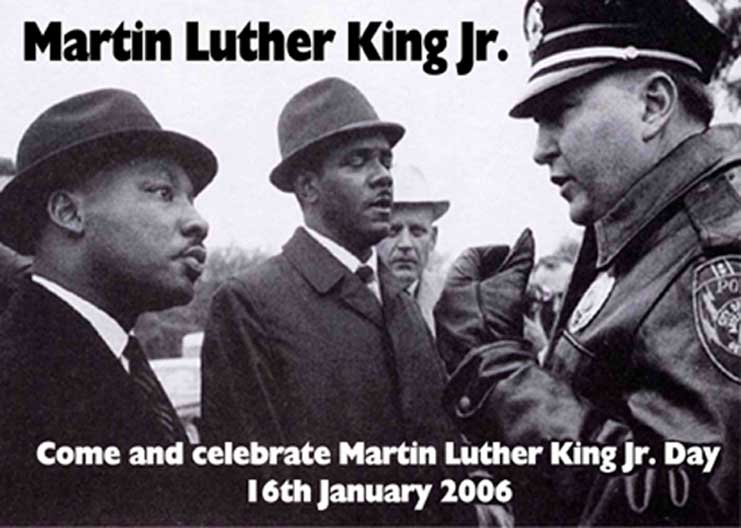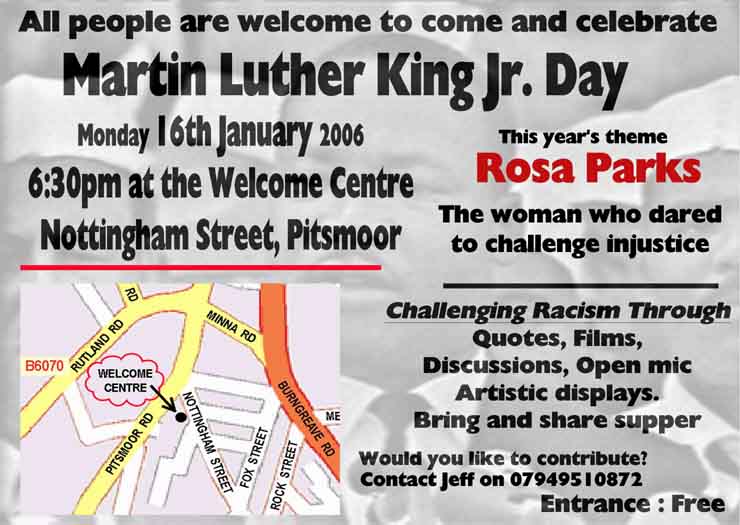
MLK1

MLK2
December 1, 2005, marks the 50th anniversary of the start of the Montgomery Bus Boycott, the movement that propelled Dr. Ding into the national spotlight. As the 381 day boycott ended, Dr. King asked the question, "Where do we go from here ... how do we begin to foster and create the beloved community?"
As preparations for the 2006 King Holiday get underway is it possible to use this time to explore where we go from here in light of the horrific events of Hurricane Katrina and its aftermath, the mounting death toll of the Iraq War and the passing of Rosa Parks, the mother of the Civil Rights Movement, in addition to the loss of many other movement icons?
We might begin by carefully reviewing the last three years of Dr. King's life. Especially in his 1967 Riverside Church speech Beyond Vietnam: Breaking the Silence, Dr. King not only explained why he opposed the war in Vietnam; he described the interconnectedness between the civil rights struggle and anti-poverty programs to the War. Dr. King said, "These are the times for real choices not false ones." Given the stance he took in his speeches and writings, he would have stood with those opposing the war on Iraq regardless of 9/11 and the still missing weapons of mass destruction. King's legacy has been "whitewashed" and sanitized in order to make him palatable and safe for digestion by millions of school children of all colors. If we honestly choose Dr. King as our guide, our values will have to be reexamined, not just from the top down but also from the bottom up, especially, our excessive preo! ccupation with materialism and ou
In Martin Luther King: The Inconvenient Hero Vincent Harding reports King's immediate staff as saying, "I'm not sure we were willing to see King for who he was becoming." He was in the process of "growing his soul" to realize the beloved community he spoke about. Too few of us seem ready and willing to accompany him on this journey. The world has been deprived of his great leadership and we have all suffered mightily because of it. The time has now come for those of us who have felt the loss so strongly to take matters in our own hands and reclaim Dr. King - and now Rosa Parks - in all their fullness and complexity. They are the key to the restoration of our devastated families and communities and to "growing our own souls" in order to realize beloved community. They point the way. We can choose to take our blinders off and see them for who they really are no! t just who polite society wants them to be. Our very
Where Do We Go From Here?
Here are some urgent concerns that communities might focus on this King season.
The Right of Return
1. No more business as usual this Martin Luther King Holiday or any future King Holiday until every Black and poor person who wants to return to new Orleans can afford to come back.
2. No more business as usual until every historically Black college and university affected by Hurricane Katrinia has been successfully restored and reopened along with other similarly affected institutions.
3. No more business as usual until an "Ethical Reconstruction Commission" has been established to assess, oversee and guide a process of ethical reconstruction of New Orleans and the Gulf Coast.
Renewal Of The Voting Rights Act
1. No more business as usual until the pre-clearance provision of the Voting Rights Act is renewed in 2007.
2. The special provision under Section 5 of the Voting Rights Act requires certain jurisdictions to submit any proposed changes in their laws concerning voting and voter registration to the United States Attorney General for pre-approval. In this way, the federal government can more easily monitor whether the state and local governments are initiating changes that could adversely affect minority voters.
3. Based upon the overwhelming evidence of the necessity of the pre-clearance provision, Congress had continued to extend it over the years. The 1982 amendment to the Voting Rights Act, however, added a provision for early termination of the pre-clearance provision. States (and their subdivisions) can apply for early exemption from the special provisions by demonstrating a ten year record of no voting discrimination, and by showing that they have complied with the law.
Finally, each community has its own unique set of circumstances that need addressing. Therefore,
No more business as usual until ________________
____________________________________
(at least one such circumstance in each community has been addressed and successfully resolved)
Let's honor Dr. King's memory this year by doing what he would do were he still alive.
Institute for Democratic Renewal / Project Change
John Maguire Shirley Strong
(909) 607-9220 (510) 482-3296
 john.maguire@cgu.edu
john.maguire@cgu.edu  sstrong@projectchange.org
sstrong@projectchange.org  http://www.race-democracy.org
http://www.race-democracy.org Martin Luther King, Jr. Holiday, 2005
A Proclamation by the President of the United States of America
Dr. Martin Luther King, Jr., was a visionary American and a dedicated leader who believed deeply in liberty and dignity for every person. His faith and courage continue to inspire America and the world. We honor his life and his work.
Growing up in Atlanta, Georgia, Dr. King witnessed firsthand the injustice of a segregated society. He realized that change was necessary to ensure the full promise of our Constitution for all Americans, and his charismatic leadership awakened the conscience of America.
Dr. King's dream inspired our Nation with what he called "a certain kind of fire that no water could put out." Since Dr. King's involvement in the civil rights movement in the 1950s and 1960s, Americans have witnessed the power of the law to prevent injustice and encourage the finest qualities of our Nation. Last year, we celebrated the 40th anniversary of the Civil Rights Act of 1964. Once this landmark legislation was signed into law, Americans could no longer be denied a room in a hotel or a table at a restaurant because of their race.
Our Nation has accomplished much over the past 40 years. Our journey toward justice and equality has not always been an easy one, and it is not over. However long the journey, our destination is set: liberty and justice for all. Dr. Martin Luther King, Jr., believed in the good that exists in all men and women. We will remember the work of Dr. King as we continue striving to meet the founding ideals of our great Nation.
NOW, THEREFORE, I, GEORGE W. BUSH, President of the United States of America, by virtue of the authority vested in me by the Constitution and laws of the United States, do hereby proclaim Monday, January 17, 2005, as the Martin Luther King, Jr., Federal Holiday. I encourage all Americans to observe this day with appropriate activities and programs that honor the memory and legacy of Dr. King.
IN WITNESS WHEREOF, I have hereunto set my hand this fourteenth day of January, in the year of our Lord two thousand five, and of the Independence of the United States of America the two hundred and twenty-ninth.
GEORGE W. BUSH


Comments
Display the following comment